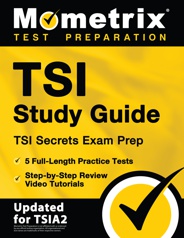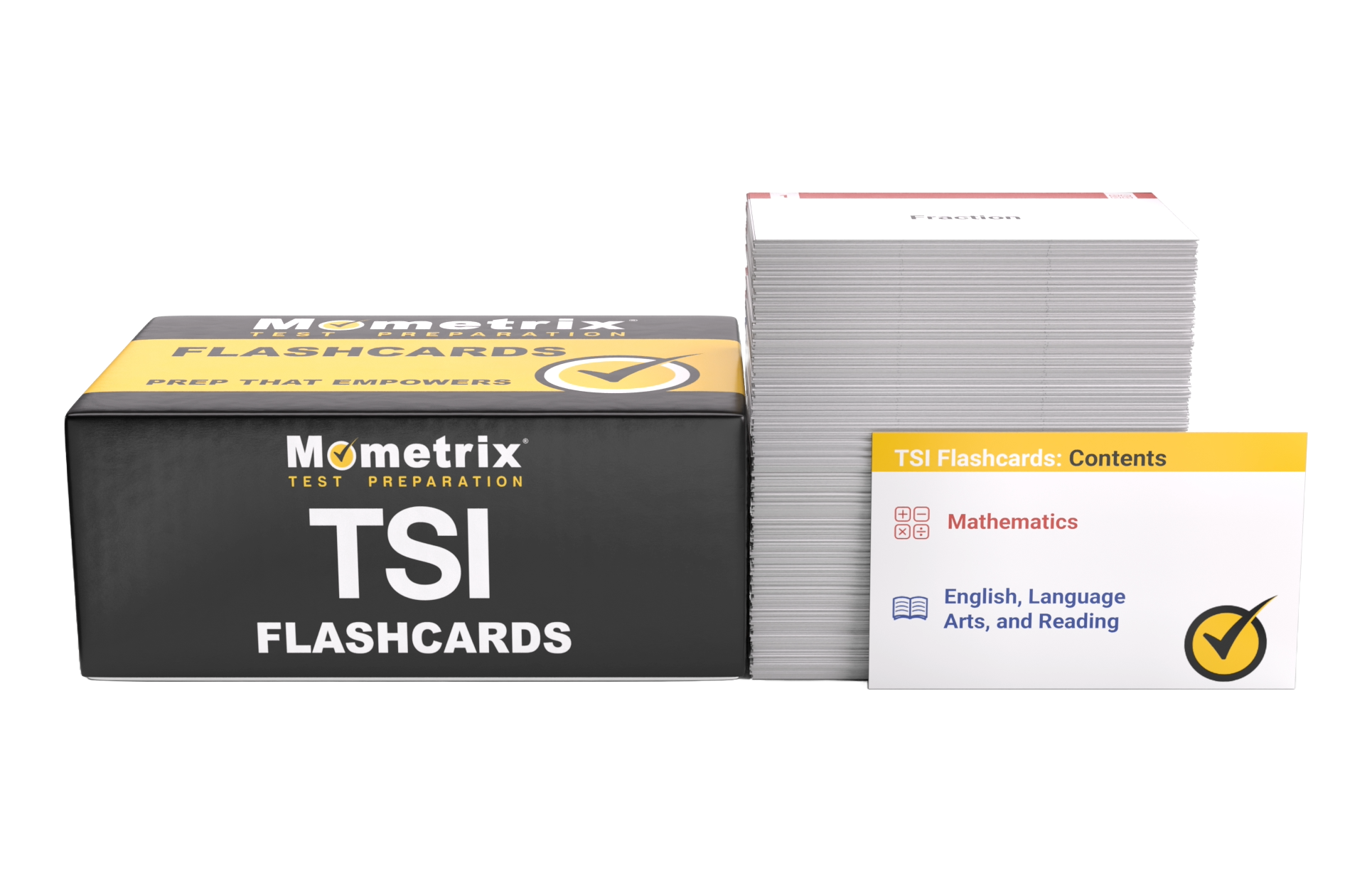Are you preparing to attend college in the state of Texas? Many of the state’s colleges require students to complete the Texas Success Initiative Assessment 2.0, or TSI Test, as a method of determining academic readiness and the right level of course work for each student.
Check out our premium-quality TSI test prep resources by clicking the links below!

What is the TSI Test?
The Texas Success Initiative Assessment 2.0 (TSI) is the revised version of the TSIA1, updated and improved to support student success through effective testing and guidance. The Texas Success Initiative requires all Texas public institutions of higher education to determine their students’ readiness for success in freshman-level academic courses. All students entering Texas public colleges, technical schools, and universities undergo assessment using the TSI, unless exempt.
The TSI consists of three examinations – Mathematics, English Language Arts and Reading (ELAR), and Essay. Students are placed into appropriate coursework based on their results from the TSI.
Test Eligibility
Many of the incoming students to Texas colleges and universities will be required to take the TSI Test unless they meet certain criteria for exemption:
- Meeting the minimum criteria for college readiness standards on the:
- SAT
- ACT
- English III/Algebra II STAAR exams given at the end of high school
- Obtaining these scores within 5 years from starting college, as they are good for 5 years as applied to TSI exemptions
- Successfully completing courses in English and math at the college level or a high school College Preparatory course
- Enrolling in a Level-One certificate program
- Taking classes but not planning to get a degree
- Serving or having served in the military
You may be required to take one content area or both content areas, depending on how you’ve met the exemption qualifications. If you’ve selected a college, they will notify you if you are required to take the test prior to attending. If you have questions about your eligibility status, talk to a freshman advisor to get answers.
The Pre-Assessment
Prior to registering for the TSI exam, you will be required to complete the mandatory Pre-Assessment Activity, which provides information and practice for the actual test. In the pre-assessment, you’ll conduct the following activities:
- Review an explanation of the TSI and its importance to you
- Complete practice questions, which are unscored but provide feedback
- Read about your options for developmental education, should you need it, as identified by passing the actual TSI
- Learn about resources at your school and in your community that can support your success in college
You’ll schedule the pre-assessment with the college you’ll be attending. It’s required. You can’t sign up for the TSI until the Pre-Assessment Activity is completed and you receive the certificate to sign up for the TSI. It’s free and takes about 30 minutes. The feedback offered can be helpful when taking the exam.
Once you’re in the system, you’ll gain access to the student portal, where you find a variety of helpful information and tools. The portal offers a TSI study app, sample questions, tutorials, test results, and information on how to send out your results.
Check Out Mometrix's TSI Study Guide
Get practice questions, video tutorials, and detailed study lessons
Get Your Study Guide
TSI Test Outline
The TSI exam covers two multiple-choice sections: Mathematics and English Language Arts and Reading (ELAR) and the essay. From the beginning to the end of the exam, the multiple-choice questions on the test automatically adjust to build or decrease in complexity based on your previous responses.
If you don’t show academic readiness in the first part of the exam in either section, you will be presented with a diagnostic subject-specific test. This gives you another chance to perform at a higher level.
This computer-based exam provides an initial testing period without a time limit, and the test will have an option for you to save your work to finish at a later time. From that point, you have 14 days remaining to complete the TSI. The essay part of the exam is the exception to this option. Once you begin the essay, you must finish in that session. Let’s look at each of the main content areas of the exam in more detail.
Mathematics
In the Mathematics section of the College Readiness Classification (CRC) Test, 20 questions test four aspects of knowledge in math:
- Quantitative Reasoning includes ratios, proportions, percentages, and linear equations and expressions
- Algebraic Reasoning includes solving equations, evaluating functions, and solving problems in context
- Geometric and Spatial Reasoning includes measurement system conversions, geometric problem-solving, transformations, and right triangle trigonometry
- Probabilistic and Statistical Reasoning includes classifying and constructing data representations, interpreting probability, and describing data concepts
If you received the diagnostic test, there would be 12 items in each section for a total of 48 questions. Take your time and answer questions carefully to give yourself the best opportunity to improve your score.
Calculators may not be brought into the testing facility. If a calculator is needed and allowed, an on-screen version will pop up for you.
ELAR
A 30-question section, the ELAR College Readiness Classification (CRC) Test has two multiple-choice content categories:
- Reading-focused questions concern literary text comprehension and analysis as well as informational and argumentative texts
- Writing-focused questions concern sentence, paragraph, and draft revision and editing
If you are provided the diagnostic test, it will have 48 total items, with 24 in each of the named categories.
The essay tests your ability to read and write with a prompted 300-600 word writing assignment. You may not use any tools to assist, except for scratch paper and a writing tool that can be requested from the proctor for your rough drafts. Scoring is based on the following qualities:
- Purpose and Focus
- Organization and Structure
- Development and Support
- Sentence Variety and Style
- Mechanical Conventions
- Critical Thinking
All six qualities support the level of writing required in a college curriculum.
Check Out Mometrix's TSI Flashcards
Get complex subjects broken down into easily understandable concepts
Get Your Flashcards
Registration
Registration begins by contacting your college academic advisor (or, if you’re a dual credit student, your dual credit office) to notify them that you want to register and ask where the exam will be offered. If it’s offered at your high school and you’re not dual credit, ask your counselor for registration and scheduling information. The test may be available to take remotely or in an on-campus testing center.
Each campus may have slightly different registration procedures. As a general overview of the process, the advisor will send the necessary documents and information to you and will require a copy of your photo ID. They will send the testing fees and payment information to you so that you know how to proceed. In some cases, the school district or college will pay for the TSIA2 exam. In other cases, you’ll be responsible for the fee.
After you’ve received confirmation of payment and registration, you’ll schedule the date and time for taking the exam. If for any reason you miss your test appointment, you will be required to reschedule. It’s best to make the first appointment and begin the exam so that you can receive your results and move forward with your next steps.
Certain students require disability accommodation. If you’re in this group, contact the office on your campus that assists students with disabilities to request accommodations and to submit appropriate documentation.
Scores
The actual benchmarks on the TSI college readiness scale are as follows:
- ELAR: CRC score of 945-990 plus a minimum of 5 on the Essay Test, or a CRC score under 945 with a Diagnostic Test score of 5-6 and an Essay score of at least 5
- Mathematics: CRC score of 950-990, or a CRC Test score below 950 with a Diagnostic Test score of 6.
The scores will be released immediately following completion of the assessment. You’ll receive one of the following score levels:
- Basic – you need significant improvement in the subject area
- Proficient – there’s some room for improvement in the content area
- Advanced – you’ve shown exemplary skills in the content area
In addition to these descriptors, you will be provided with an explanation detailing your strengths and weakness further.
Use these scores to send to your college of choice immediately (and in the future, should you decide to transfer to another school). The scores will also remain available in the TSI student portal.
Your TSI score determines your level of college curriculum readiness, but the advisor determines how to place you, whether it’s in remedial courses or in college-level courses. The TSI is only one factor in the school’s decision-making; they may consider your high school GPA and other academic records. The advisor will review your major, if determined, as part of the decision-making process as well.
If you’re satisfied with your enrollment status, placement, or options, you can enroll as appropriate. With a low score that you’re not satisfied with, you can retake the exam. The retake is available year-round, although your college may have guidelines about when you can complete it. It’s a good idea to discuss your test results and options with your college advisor. Remember, on a retake, you are only likely to improve your score if you study before sitting for the exam.
If you don’t retake the exam, the advisor will enroll you in remedial courses or whatever level of courses line up with your TSI results. It’s possible that you will do well in one or two subjects and poorly in the other one or two. Your course placement would be affected only for that content area, math-, reading-, or writing-heavy courses.
What Happens after I Take the TSI?
TSI scores are released the same day you complete your test, and will be sent to you electronically. You can then choose to send your TSI scores to the college of your choosing, and your next steps proceed from there. Another important note is your ability to reuse these scores if you decide to transfer schools later on during your academic career.
If you do well on the TSI, you are deemed ready for college curriculum and can proceed with regular enrollment procedures. However, if you receive a low score on the TSI, don’t give up yet. Failure of the assessment does not bar you from attending your chosen school. Rather, it alters the courses you can take during your year of entrance.
Students who score lower on the TSI have two options at their disposal. They can choose to retake the TSI exam or consult their college. If you choose the latter option, an advisor at your school will help place you in courses that match your skill level in whatever subjects you are weak in, so that you can catch up with your peers. This means that you will not qualify for college-level versions of your weaker subjects and instead will have to take remedial courses.
If you score low on the reading portion of the test, for example, you won’t be able to take courses that require heavy amounts of reading. Low scores on the writing and math portions bar you from taking advanced courses in those subjects as well. Also, you must be enrolled in these courses for a specific amount of time before you can move on to college courses in these subjects—specifically, the entire semester.
Retaking the TSI
If you choose to retake the TSI exam, you can do so at any time of the year. If you pass your retake, you are free to enroll in any college-level courses in the subjects featured on the TSI as you so choose. Individual colleges have their own rules about how retesting works, when retesting will take place, and how soon you must take your retest without it affecting your class enrollment choices for the oncoming semester. However, retaking the test is a valuable opportunity if you do not wish to take remedial courses.
Should you choose this option, it is heavily important that you study as much and as hard as you can. How well you study this time will determine your level of improvement in comparison to your previous score. Many testing centers offer classes to help students taking the TSI learn how to study properly and prepare themselves for the exam. You may also find a large body of testing preparation materials online, which are provided by many schools throughout the state of Texas. It would be wise for you to consult the testing center where you’ll be taking your retest in order to figure out scheduling for both any study classes at the center and dates for the test.
How to Prepare
To succeed on the TSI exam, prepare with practice tests and study materials.
First, the Pre-Assessment Activity will provide indications of your potentially weak areas, so you can focus on developing those areas. Online resources and study guides, such as the Mometrix online courses, the TSI study guide, and the flashcard study systems, are available and can help you improve your score.
You can study alone, or you may have some classmates that will join a study group with you. Students in study groups help to keep each other more accountable and allow them to work through questions together. Whether you study alone or with others, don’t skip this important preparation that can affect your college course placement.
Once you have taken the Pre-Assessment, studied materials, and taken practice exams, what else can you do to prepare for a test day? Prepare your mind and body for a day of mental concentration and sitting in a chair in front of a screen. Eat well heading into the test day, and eat a light meal before you begin. Heavy foods may make you sleepy. For a few days before the exam, get a good amount of sleep on a schedule that allows you to be very alert at exam time. If you get stressed by exams, plan some relaxing, low-stress activities such as exercising, taking a walk, or enjoying time with a friend.
Know the rules of the test center or for taking the exam remotely. Be aware of what items you are permitted to have with you during the test. Generally, test centers don’t allow phones or tablets, food, purses, or backpacks. There’s likely a break time, so find out if the number and length of breaks are regulated and if you have to save your work before taking a break. Plan to be on time. Set as many alarm clocks as needed, and give yourself plenty of time to get ready and, if going to a test center, to travel to the center. Arriving early is always a good plan, getting you off to a great start on the TSI Exam!
Whether you are taking the TSI for the first time or retaking it, Mometrix Study Preparation has the tools you need to help you prepare for this highly important exam. On our site, you’ll find a number of valuable study tools—such as videos, practice tests, and more—to help you know what to look out for on the exam and boost your chances of success. Feel free to take advantage of our study tools. We hope we can help you succeed.
TSI Test Online Prep Course
If you want to be fully prepared, Mometrix offers an online TSI prep course designed to give you everything you need to succeed!
Here’s what you’ll find in the TSI course:
- 100+ Review Lessons Covering Every Topic
- Over 1,500 TSI Practice Questions
- 250+ Video Tutorials
- 500+ Digital Flashcards
- Money-back Guarantee
- Mobile Access
Everyone learns differently, so we’ve tailored the TSI online prep course to ensure every learner has what they need to prepare for the TSI exam.
Click below to check it out!



